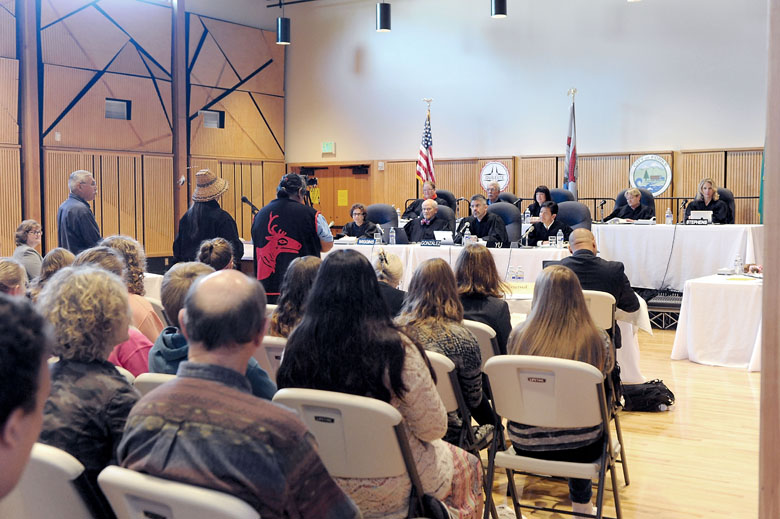FORKS — It has 18 legs, nine heads, wrestles the state Legislature over public school financing and says it loves Clallam County’s West End.
It’s the state Supreme Court, and it visited Forks and nearby communities Wednesday and Thursday to let people see the judiciary system in action.
The three criminal cases in which it heard oral arguments Thursday centered on sharp points of law, but the justices addressed broader issues in a forum Wednesday afternoon at Peninsula College’s Forks branch campus, 481 S. Forks Ave.
Justice Sheryl Gordon McCloud was absent Wednesday, delayed by a six-hour closure of the Hood Canal Bridge, although she attended Thursday’s sessions.
The others — Chief Justice Barbara Madsen, Associate Chief Justice Charles Johnson and Justices Charles Wiggins, Steven González, Mary Yu, Mary Fairhurst, Susan Owens and Debra Stephens — were eager to explain the court’s constitutional role.
That role pits it against the Legislature in its McCleary decision, which holds lawmakers responsible for restructuring financing for public education.
Justices also said charter schools were not public schools under the state’s constitution.
They didn’t mention that case at all and barely spoke of McCleary — in which they have fined the state $100,000 a day for contempt in not showing progress toward education finance reform — but stressed that the checks and balances among the judicial, legislative and executive branches of state government are vital to ensuring citizens’ liberties.
The visit was a homecoming for Owens, who served 19 years as a Clallam County District Court judge in Forks.
She also worked five years as the Quileute tribe’s chief judge and six as chief judge for the Lower Elwha Klallam tribe.
Owens is in her 15th year on the Supreme Court.
“I sort of surprised everybody when I ran for the Supreme Court,” she recalled.
“I got a lot of what I thought were condescending questions when I went around to the [newspaper] editorial boards, like ‘Do you ever think about civil rights?’
“I think about it every day. The laws are the same; the laws of contracts are the same; the laws of evidence are the same.”
Owens said she ran “so there would be the presence of someone from a rural community on the court.”
Governor given choice
Diversity also was the motivation for Yu, the court’s first Asian and Hispanic justice.
Appointed by Gov. Jay Inslee in 2014 and subsequently elected to her post, she says she offered her name for consideration because “I never wanted the governor to be able to say, ‘I didn’t have a choice.’”
Wiggins, one of three minority male members of the court, also stressed diversity.
The justices earlier Wednesday had visited schools in Clallam Bay, Amanda Park and Forks.
Wiggins said he’d showed photos of the nine justices to Forks Intermediary School students earlier that day and asked what they noticed about the panel.
The seventh-graders didn’t “get it,” but the older students did, he said.
“’Wow, there are a lot of women on the court,’” they said.
“That is a huge change” since 1976, when he began practicing law, Wiggins said.
“There were no women — never had been women — on the Supreme Court.
“Is it a good change? Yes. Unequivocally, it is a good change.”
Wiggins also noted Yu’s and González’s ethnicity.
‘Vigorous’ campaigns
“We’re very proud of that,” Wiggins said, in addition to six justices starting their terms by being elected.
Besides Yu, appointed by Inslee, Stephens and González were appointed by Gov. Chris Gregoire but subsequently won election to six-year terms.
“We have some very vigorous campaigns,” Wiggins said. “That gives [voters] an opportunity and a responsibility — an opportunity to participate, but a responsibility to learn about who we are.”
The result is what Madsen called “a hot court” in which justices actively question the attorneys who appear before them, ordinarily in the Temple of Justice on the state Capitol Campus in Olympia.
Although some court critics decry oral arguments as a delay to deciding, Stephens said they are necessary to thrash out an issue.
“Oral argument is a conversation,” she said. “It should be a give and take. It’s not a good day for an appellate attorney if none of the justices ask questions.”
She also compared an attorney appearing before the court to a batter stepping up to the plate.
“You’re looking for the right pitch and you want to hit it out of the park,” she said.
“That opportunity doesn’t come around a second time.”
And the arguments open the process to differing points of view among the nine people who’ll decide the case.
“I believe the more difference, the better,” Yu said.
“You don’t want a court that all thinks alike. You want people who are going to debate it, fight it, stay in that room with all the differences and try to find commonality.
“I am so proud of our court, that we could take the rule of law and debate it and discuss it in such a civil manner as to come out at the end of the day with a decision.”
_______
Reporter James Casey can be reached at 360-452-2345, ext. 5074, or at jcasey@peninsuladailynews.com.

